Gene Tierney (1920 - 1991)
Picture Perfect, or Truly, Madly, Deeply

Every few years a newspaper publishes an opinion piece by a woman writing about how she struggles to make friends, but is still successful because of her ‘pretty’ privilege. The comments section suggests that most people do not, in fact, find her attractive and that she is kidding herself. Because even though we know that there is a privilege to prettiness (to the extent that we don’t want to face the world with a pimple, or a ‘bad-hair' day), we don’t want to hear about it. It feels like bad taste to suggest you are a person benefitting from looking good.
We want to believe that life has a way of redressing the balance That someone, conventionally attractive, must also be slow or dull. Or better – their life must be a struggle to be taken seriously.
When I see this argument played out in the press I think of Gene Tierney – the actress who personified the tension of picture perfection and the insanity of a real life.
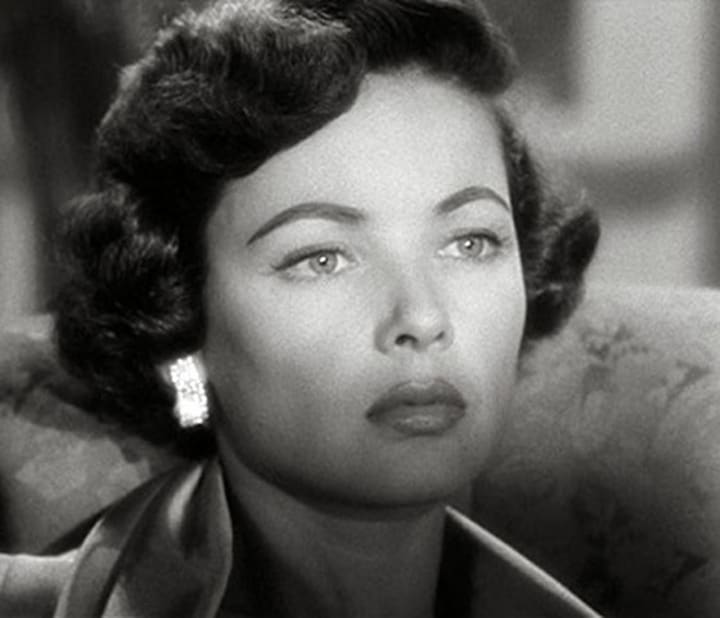
Gene Tierney was once described as “the most beautiful woman in movie history” by Darryl Zanuck.
Gene was a brunette with clear, slanted green eyes and a crooked over-bite that gave her plump lips a natural pout. She was strikingly pretty.
But David Thompson wrote of her performance in Whirlpool (1950), she ‘seldom got past her own gorgeousness’. And Otto Friedrich called her ‘a girl of considerable beauty, but without either great talent or that animal ambition that vivified a Joan Crawford or a Barbara Stanwyck.
So, what do we have here? A poor, little rich girl – gifted a movie career because she is easy on the eye, but doomed to a lack of credibility and critical respect.
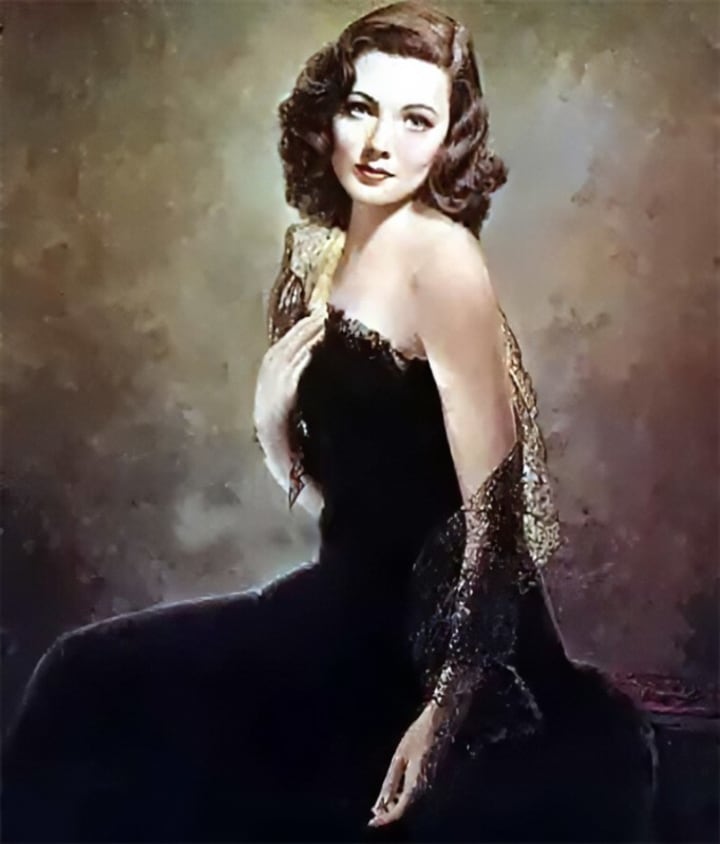
Gene Tierney’s first important movie was Laura (1944) where for the first half of the film she is a portrait. She is the ethereal beauty that provokes a murder.
In her early pictures, she was often cast as ‘exotic’ or ‘oriental’. The kind of gal who leans against a pillar and leads men astray, but not so foreign that she can’t hook up with a leading male star. The studios couldn’t quite pin down her appeal.
However, after Laura, Tierney was firmly established as a dangerous beauty. This allowed her to play Ellen in Leave Her to Heaven (1945), the murderously jealous wife. A role, Gene herself, thought should have gone to Bette Davis. It earned her an Oscar nomination, because as Noel Coward said of the cold-hearted look Ellen gives watching her brother-in-law die, “That is acting”.
I’ve watched the films. She is picture perfect and the performances are good, contained, restrained.

Have I just damned her with faint praise? Because none of the words I’ve used say ‘wow’ or ‘amazing’. They are about competence and understatement.
But they could also be about subtext and subtlety, a deftness of touch that displays an understanding without shouting it.

Tierney’s upbringing sounds idyllic and privileged. Her parents owned a large mansion house in Connecticut, she attended a European finishing school and had a society debut. She was ‘discovered’ on a studio tour of Warner Brothers and offered her first screen test and movie contract at the age of 17.
And she was courted by the biggest playboys of the day.
There was Howard Hughes:
“One evening he came to my home carrying a brief case. Inside was a jeweller’s tray filled with diamonds and pearls. He said, ‘is there anything in here you’d like?’”
There was Aly Khan:
“We swam together, danced and laughed together. I was his hostess at receptions. His parties were the start of the jet set. It was easy to be dazzled at first by that role, greeting his important and sometimes royal friends.”
And there was John F Kennedy:
“We were having lunch one day in New York. He looked at me and said out the blue, ‘You know Gene, I can never marry you’. I sat still and in a voice just above a whisper, I said, ‘Bye, bye Jack.”
She married the Hollywood costume designer Count Oleg Cassini.
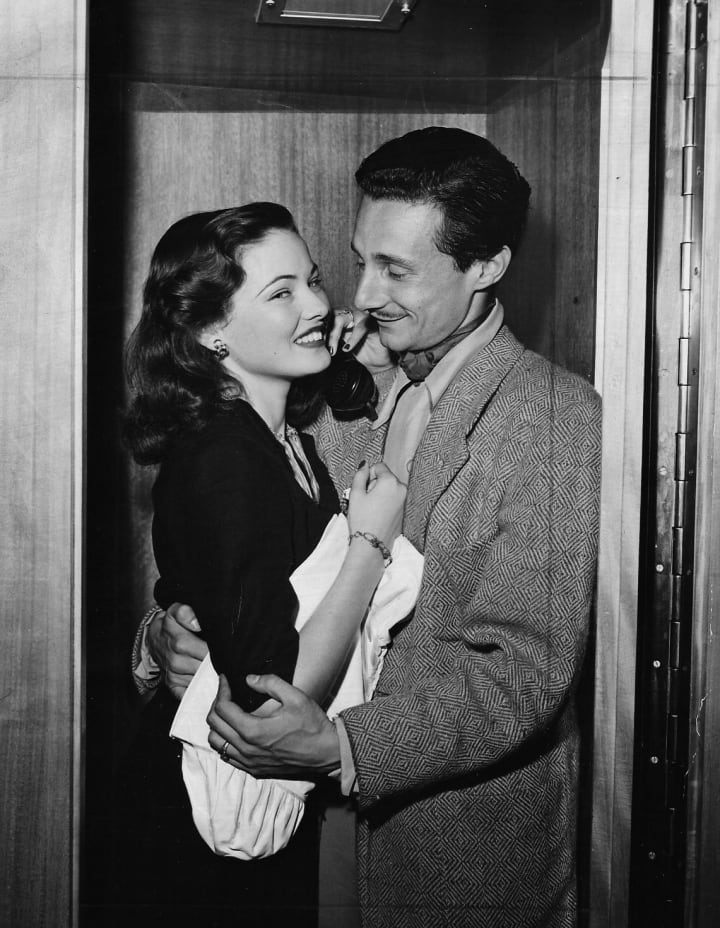
So far, so perfect. But then why does her autobiography start with her fourteen flights up, standing on a ledge, imagining what her body would look like on the sidewalk?

She understands the perceived paradox of being pretty and privileged and feeling wretched. She writes:
“There was those who would hear about my illness, shake their heads and say, simply, “She was a Hollywood star.” Sometimes the tone suggested that this status explained my problem. Weren’t most Hollywood people neurotic? At other times this description was offered almost accusingly, as though any actress who lost her mind had abused a privilege.”

Of course, Gene’s story is more complicated than the two hour movies she starred in. My 1940s imaginary screenwriter persona would struggle to condense her life. Here are some scenes I would include.
Gene working on Son of Fury, co-starring with Frances Farmer. Farmer's mental health was in decline. Farmer threw a brush at one of the hairdressers, she had tantrums on set. It would be Famer’s last film and two years later, her mother would have her committed. Tierney would watch this unfold unknowing that it foreshadowed her own experiences of hospitalisation.
Gene acting with Henry Fonda when the news of Pearl Harbour breaks.
Then, I would show her waving off her husband to war, and getting on with selling Hollywood bonds. She would feel the patriotic urge to work at the Hollywood canteen, even though she was in the tiring early stages of pregnancy. I would show her meeting a particularly enthusiastic fan there, a young woman in the marines, desperate to meet her heroine.
Skip forward to Gene as a mother, with her tiny premature baby, Daria. One day, she will be reading a newspaper with her daughter on her shoulder. The baby will not settle and is pulling at her ears. The newspaper will drop with a headline that shows a link between German measles and birth defects.
Howard Hughes would make a brief return into her life as he pays for Daria’s health care with a hearing specialist.
The doctors testimony that there was nothing they could do and that Daria should be institutionalised.
A scene where she discovers her father is having an affair.
Ditto the scenes uncovering Oleg’s infidelities. The back and forth of an unwise marriage, separation, reconciliation, a second child and finally divorce.
The heartbreak of knowing her divorce means she can’t marry John F Kennedy.
The slow descent into tears and darkness.
“Mother,” I would have her say, “I think I need to see a psychiatrist.”
“Nonsense, dear. There’s nothing wrong with you that a good beau and some French dresses can’t sort out.”
The tennis party, at which she is barely present, when she is accosted by a guest.
“Do you recognise me?”
Gene slowly shakes her head in apology.
“I met you at the Hollywood canteen. I probably shouldn’t tell you this. But almost the whole camp was down with German measles. I broke quarantine to come to the Canteen to meet the stars. Everyone told me I should, but I just had to go. And you were my favourite.
Gene turns away saying nothing. The screen turns black.

Can a screenwriter make depression look glamorous? Or would I have to play it for horror? The standing on a ledge. The cold water treatments. The electric shock treatments. The breaks in memory.
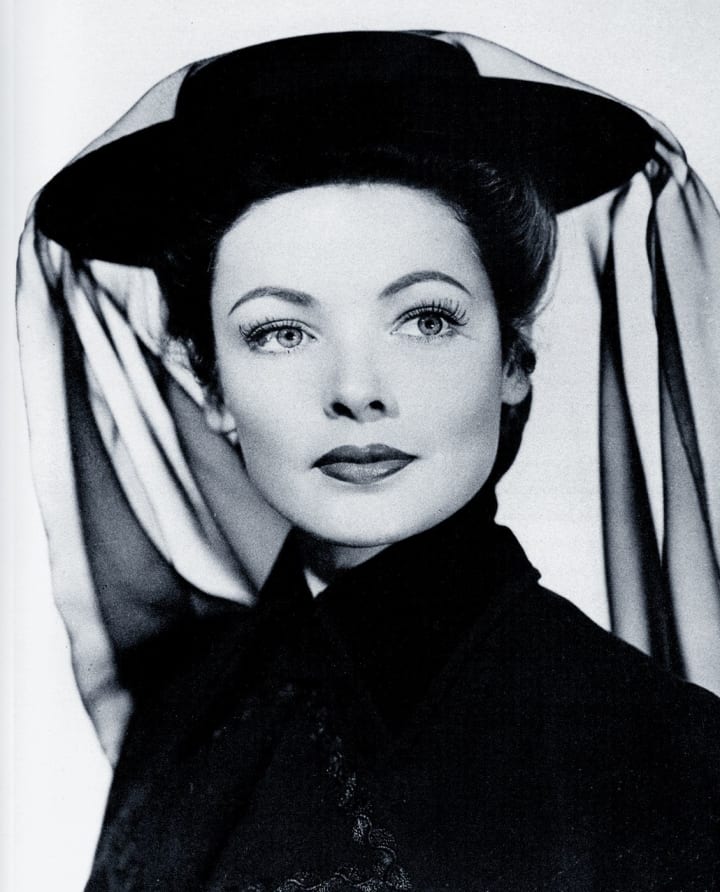
It is important you know that Gene makes a recovery from her breakdown. She will never reach the same level of fame, but she did find happiness in a second marriage and in becoming a grandmother. She also campaigned against the use of electric shock treatments for the mentally ill.
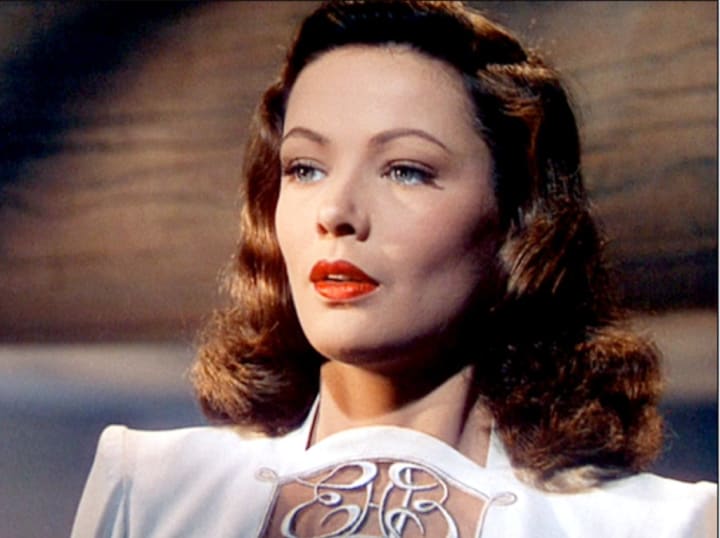
Gene Tierney undoubtedly had privileges of attractiveness, class and race.
But it was her less savoury experiences that produced her best performances. As she said of her Oscar nominated role in Leave Her to Heaven:
“Ellen was without doubt insane. She believed herself to be normal and worked at convincing her friends she was. Most emotionally disturbed people go through such a stage, the equivalent of an alcoholic hiding the bottle.”

Tierney is a good reminder of the need for nuance in discussions about privilege. Having privilege doesn’t mean she didn’t suffer. Privilege didn’t stop the misfortunes of life falling on her. It didn’t mean she didn’t have to work hard. But at the same time, under the Hayes Code, she got to play exotic, foreign women, when other women were shut out from the industry because of the Code’s baked-in racism. Her privilege allowed a lack of insight into the injustices experienced by others.
Gene lived through the Depression of the 1930s and saw her family struggle for money. She also lived through war, with a husband who served and European friends that didn’t make it. Privilege offered some insulation, through networks of support and money. But it didn’t make the mess and fragility of life disappear. It didn’t provide the connection that she needed to thrive.
Gene’s words:
“If it is possible to make a general statement about the people one finds in a mental ward, it would be that all of them have this in common: they feel unloved, alone and unwanted. Loneliness devours them.”

If you've enjoyed what you have read, please consider subscribing to my writing on Vocal. If you'd like to support my writing, you can do so by leaving a one-time tip or a regular pledge. Thank you.
About the Creator
Rachel Robbins
Writer-Performer based in the North of England. A joyous, flawed mess.
Please read my stories and enjoy. And if you can, please leave a tip. Money raised will be used towards funding a one-woman story-telling, comedy show.
Enjoyed the story? Support the Creator.
Subscribe for free to receive all their stories in your feed. You could also pledge your support or give them a one-off tip, letting them know you appreciate their work.



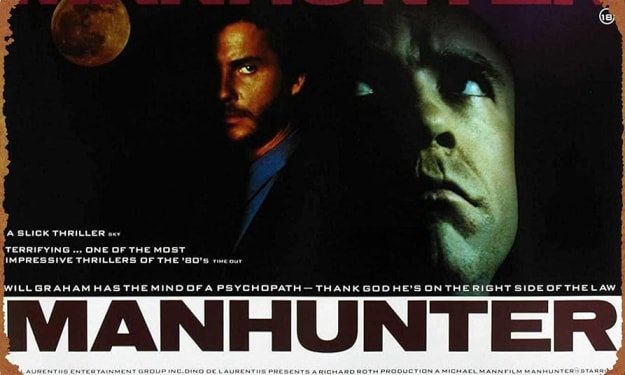


Comments (4)
Always great reading. Why is it comforting to know that famous people have the same struggles as we mere mortals. They are after all mortals also. As a kid I loved watching old Hollywood movies, I think Maureen O'Hara was one of my favourite female actors of the time.
This a beautiful & sensitive portrait of a woman of her time who did extraordinary things with the advantages she enjoyed, endured difficulties no one should have to endure (& too many do), & found her way through it all to a happy & contented life. I love this, Rachel.
Marvelous vintage celebrity story!!! Loved it!💕❤️❤️
Wonderful as ever